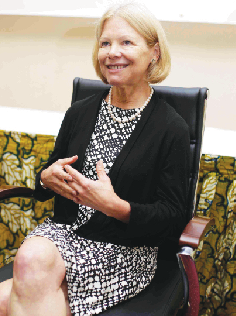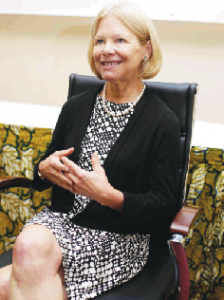Professor Kim Reynolds is the international consultant for this year’s Nigeria Prize for Literature, the children’s literature edition, which was not awarded due to poor quality of writing. In this interview with Assistant Life Editor, TERH AGBEDEH, shortly after the announcement was made in Lagos, she talks about her love for the writing craft and her work to advance it.
Before you became international consultant for the Nigeria Prize for Literature this year, were you familiar with children’s literature from Nigeria?
Before this prize, I only read adult novels; I never looked at any children’s literature before. But, yes, I have been enjoying over the years the Chimamanda Adichie novels. I bought the book that has just been shortlisted for the Man Booker Prize called The Fisherman (by Chigozie Obioma). So I think, for a long time, these have become almost canonical books in English as well; they are Nigerian literature, but they are world literature, and I think you can aspire to that for the children’s books, too.
Children’s books seem to be becoming a bit younger in tone.
I think that is very true. I don’t know, but I imagine that once here, as in most countries, children and adults shared the literature, the folktale, the fairy tales. Traditional tales had a mixed audience and gradually they got taken over and directed at children. There is a kind of dumbing down when that happens and a loss. When you lose the adult ones, then the complexities in the nuance often kind of goes. What has been happening a lot in Anglophone literature is that we are getting that restored; we have what we call Process Literature, and Harry Porter was probably the most famous one. That won’t necessarily be the greatest literature, but it is the kind of story that is possible to enjoy at all levels. We have many more examples of that now, so that has become the trend and I think bringing in adults back into children’s literature is saying what we need are good stories that can be enjoyed by any age group. That is what children’s literature is: storytelling that doesn’t have adult content but might have mature themes in terms of philosophy or ways of introducing children to the complexities of the world.
You started what became the National Centre for Research in Children’s Literature; do you think we need to start something like that here, particularly considering what has happened with the Nigeria Prize for Literature this year?
We have started to talk about what will make children’s literature more robust and strong here and it is a slow process. So teachers, librarians are very important to that. Literary critics and scholars are, too. They can reach out and tell a wider platform about what is happening. So, yes, that national centre has been very important for bringing together the practitioners and the theorists. They feed off each other and I think the people who are actually creating the books sometimes don’t understand all the potentials of the medium they are working in like somebody from outside.
Must all children’s books have pictures?
It is not a requirement for children’s books to have a picture, but Alice in Wonderland begins by saying, “What is the point of a book without pictures and dialogue?” So, for me, if you go back and look at the earliest literature, they were illuminating and there were always stories and pictures. It was in the late 19th century when you had famous writers, PD James, who wanted to say the novel is a serious form, not for children, but for intellectual men. He took the pictures out and said, “I don’t need to put pictures in my book.” But before that, all these great writers were illustrated and serialised, so I think children’s literature has actually been preserving that relationship between the book and the image in a way that is really important.
Oliver Twist by Charles Dickens was pretty much not for six-year-olds and you could read it up to 18 and still enjoy it. One hopes that what is being said here is not that to write for children it has to be infantile in a way.
If you go to a children’s doctor, you don’t think that the paediatrician is not as good a doctor as the doctor for adults. If you design architecture or clothing or anything else, you need the same skill, but you need to do it with a child’s body or a child’s mind. Sometimes simplifying in terms of language or the quantity of material doesn’t mean dumbing down. Poetry is often shorter than novels, but it could be more profound. So, I think children’s literature is capable of being very lyrical, very profound and very philosophical.
Is this your first time in Nigeria?
Yes.
Why did it take you so long?
Nobody invited me. The world is a big place. I have been to South Africa because they have a very dynamic children’s literature culture. Most of my travel is done in relation to my work because there is children’s books all over the world and I am interested in them and I get to know the people there. So having come here, I hope to come back and get to know you better. And having read some of the children’s books; though they weren’t very good, I still found it fascinating to read them and I learnt a lot about Nigerian culture by doing so. So, it was not a wasted effort at all.
So, before you became international consultant for this year’s edition of the Nigeria Prize for Literature, you had not read children’s literature from Nigeria?
I have read adult fiction, but not children’s literature, and I hadn’t come across it. There are some international book fairs where publishers go and pitch their books, and I tend to try to get to those every couple of years and I hadn’t noticed Nigerian stands or seen Nigerian works. I don’t know whether they are not there, or just not standing out in the crowd. But I think it is worth studying what is happening, even with some emerging countries who are doing really great work in children’s literature suddenly, and I know this country is capable of doing that.
As someone whose work has been in children’s literature, is there something you would like to do to improve children’s literature in Nigeria?
If I could just do one thing, I would bring a selection, a box of books that I think are really wonderful children’s books that will last for a decade, maybe for generations, and share them with some of the writers here. And get them to talk to me about how storytelling works here, how they would respond to those books and what they might do themselves that will be unique and Nigerian.
Could you please share a few titles with us?
One of the books that excites me at the moment is a book called The Arrival by Shaun Tan whose family migrated to Australia, his parents were Chinese and he is Chinese/Australian. It is a novel, but without any words in it at all. It is a very rich story. It is as complicated as a novel.
Just images?
When you say just images which stand up against most novels that I know.














